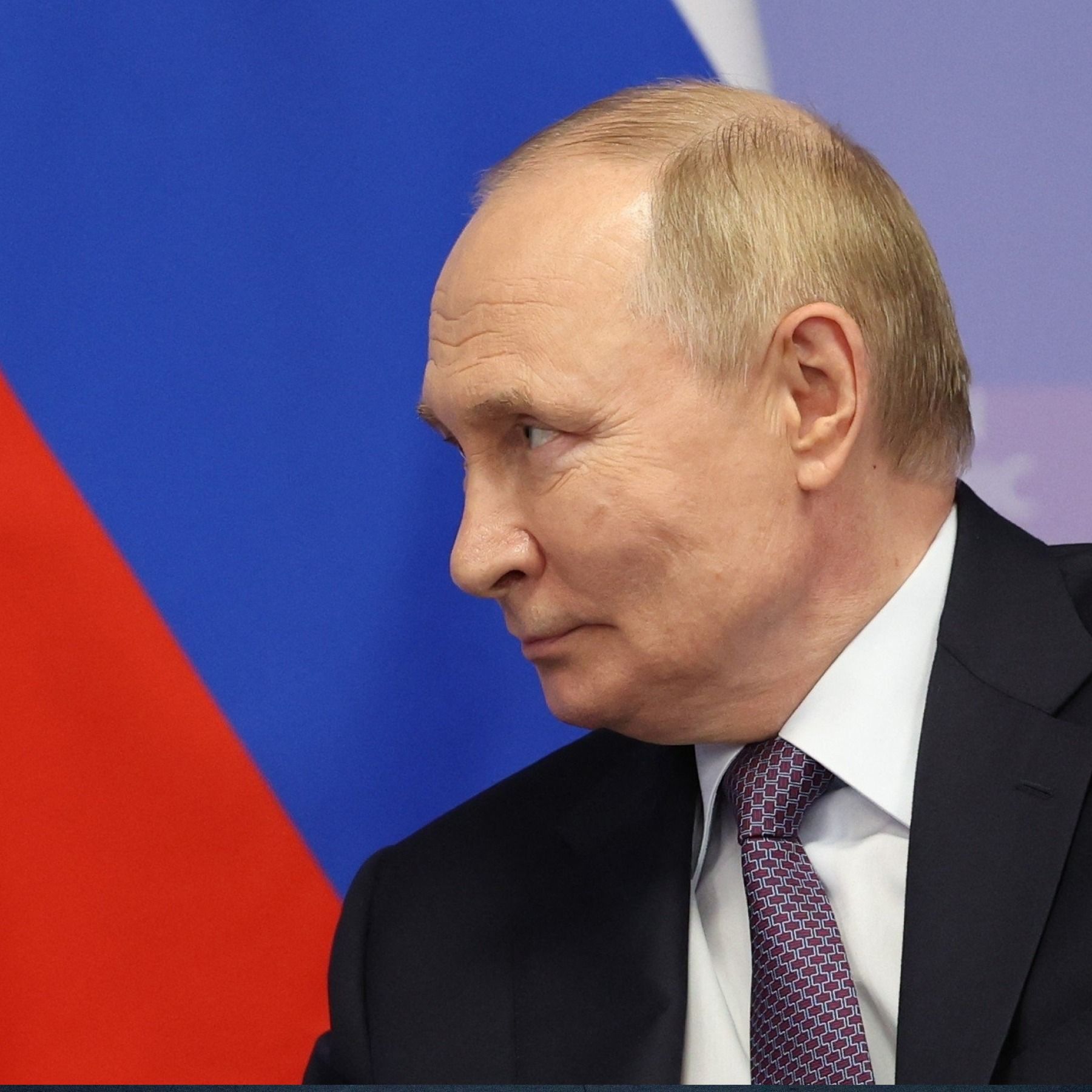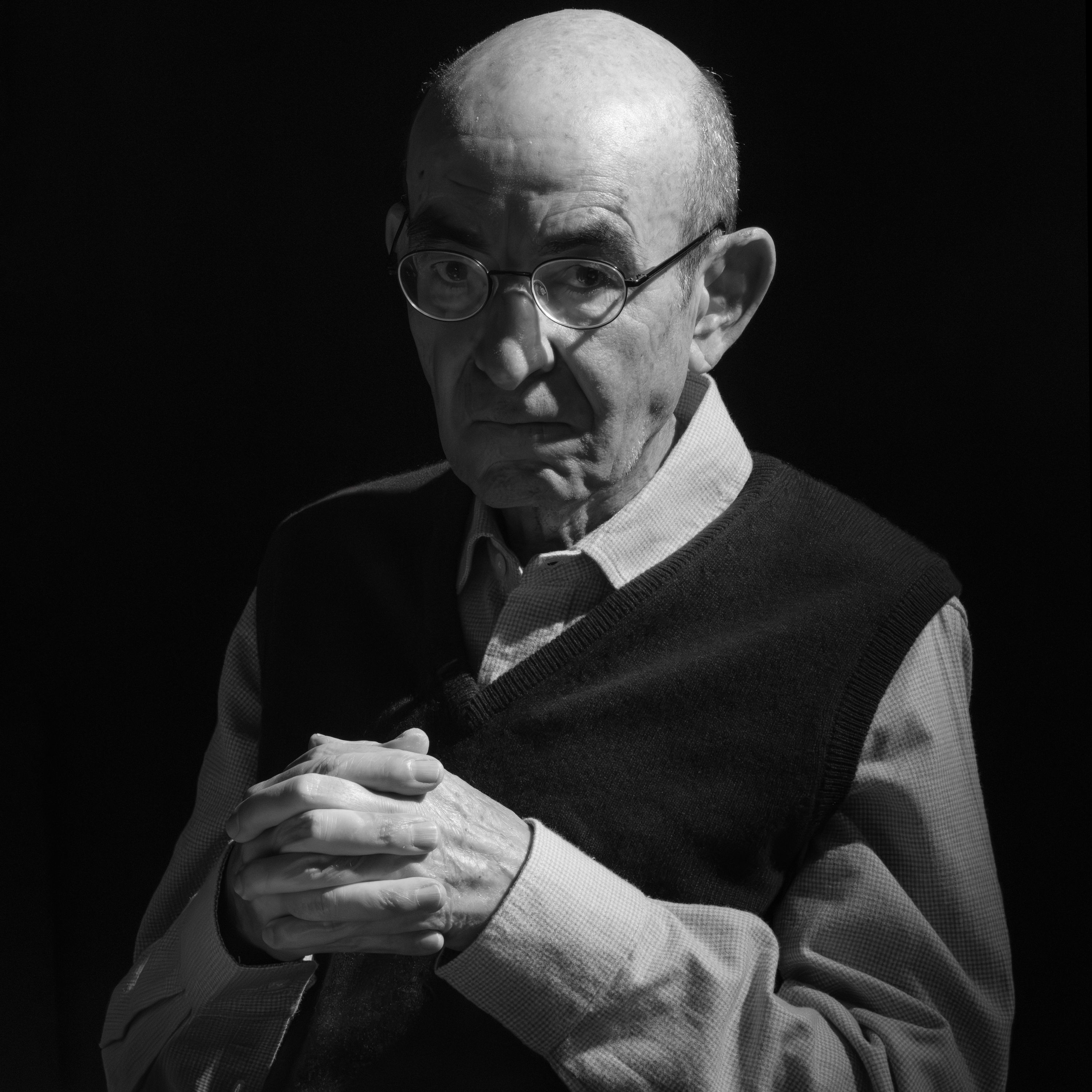Putin’s War Machine
It’s the latest in a relentless Russian offensive that keeps escalating, despite President Trump’s efforts to negotiate peace.
Anatoly Kurmanaev, who covers Russia for The Times, discusses the economic war machine that’s driving Russia’s success on the battlefield, and making it so hard for anyone to get President Vladimir V. Putin to back down.
Press play and read along
Transcript
Brought to you by the Capital One Saver Card. With Saver, you earn unlimited 3% cash back on dining, entertainment, and at grocery stores.
That's unlimited cash back on ordering takeout from home or unlimited cash back on tickets to concerts and games. So grab a bite, grab a seat, and earn unlimited 3% cash back with the Saver card.
Capital One. What's in your wallet? Terms apply.
See CapitalOne.com for details.
From the New York Times, I'm Natalie Kitroff. This is the Daily.
Over the weekend, Russia bombarded Ukraine with the largest drone assault in the war thus far.
It's the latest in a relentless Russian offensive that keeps escalating despite President Trump's efforts to negotiate peace.
Today, my colleague Anatoly Kermanayev, on the economic war machine that's driving Russia's success on the battlefield and making it so hard for anyone to get Putin to back down.
It's Tuesday, September 9th.
Anatoly, welcome to the show. Thanks for having me.
You know, I first met you in Mexico. We were both there as correspondents, but you left.
And for the last couple of years, you've been reporting on Russia, which is incidentally where you grew up.
And you told me at one point that you felt people had an incomplete picture of this war because they really weren't understanding the forces inside Russia that were driving Putin and enabling his ambitions on the battlefield.
That's right, Natalie. I think the images that the world
saw in the first months, the first year of this war pointed to Russia's imminent collapse.
You know, the conversations that were being had in diplomatic dinners, receptions in the West at the time were about collapse.
You know, it wasn't just that the invasion of Ukraine will fail, that Russia is a state, is about to disintegrate, leading to downfall of Putin and perhaps even the end of Russian nation-states and the current borders as we know it.
And I always felt this was triumphalist from a Western perspective, from the perspective of Russia's adversaries.
And they were missing the broader picture and the forces that Putin was mustering to stay in this fight. And then you fast forward to today, and you see Putin hobnobbing with Trump in Alaska on U.S.
soil, getting red carpet rolled out to him. You see him traveling to China and meeting with leaders of developing worlds.
You see just the confidence that he exudes when he speaks.
And Russia has not won. It is not about to receive Ukrainian capitulation, but Putin is acting that he's on course for victory.
So I set out to try to explain to our readers what forces, what processes led Russia to be where it is today, led Putin to be where he is today.
And let me just say, let me just acknowledge your reporting has really changed the way I've been thinking about this war and about about Russia because it's shown just how much Putin has turned things around and in his favor over the last couple of years.
So I want to start there. What is the evidence that Putin has gained the upper hand in this war?
First of all, it's the territory. Russia's inching forward every month.
These are not major breakthroughs, but in the war of attrition, in the war that's largely been deadlocked, the Russian advances over the course of the summer offensive have been significant.
But underneath these territorial changes, these advances lay, I think, even larger trends.
And the biggest among these trends is the fact that every day more Russian troops are facing fewer Ukrainian defenders.
The balance of forces is heading in the direction that is not sustainable for Ukrainian defenses at this stage.
Russia has also caught up with Ukraine and in some cases overtook Ukraine in terms of production of drones, crucial weapon of this war. And it is winning the economic war.
It is raising and throwing into the war more money than Ukraine is able to.
So in the war of attrition, which is frankly the war of resources, it's a war who can mobilize and use their resources more efficiently than the enemy.
Russia is winning, which means that as a matter of time, if the current trends continue, that Russia will achieve the victory it is looking for.
So you're describing success on many fronts for Russia. Let's look under the hood there.
How did Putin pull this off?
The two major columns of his, if not success, then his ability to stay in the fight is men and money.
His ability to recruit enough men and throw them into battle, and his ability to continue earning revenues that power his war machine.
And these are the two pillars that have enabled him to be where he is today and dictate his terms. Okay, so walk me through when this turnaround started.
The crucial moment came in September 2022.
Military experts say President Vladimir Putin's war in Ukraine has not gone according to plan.
At the time, Russia was on the verge of complete collapse. Ukrainian resistance is defying expectations and complicating the Kremlin's efforts to seize the country.
Its forces had to retreat from Ukraine capital, Kiev. They were taking huge losses.
The army was running out of men, was running out of weapons. And it seemed like this war was about to end.
And then Putin did something that no one expected.
Russian President Vladimir Putin says he has signed a decree ordering the partial military mobilization of Russia's armed forces beginning today. He
called the first military drafts in Russia since World War II, drafting
about 300,000 men.
From Moscow to Siberia.
Anger growing and hundreds arrested. And this was a tremendously disruptive political event in Russia.
Recruiters were just grabbing men from the streets, going to people's homes. Hundreds of thousands escaping the fighting in Ukraine, fleeing the draft at home by flooding the border into Georgia.
Hundreds of thousands of young Russian men fled the country to avoid being drafted, dealing a massive blow to the Russian economy.
It was a hugely, hugely unpopular moment in Russian society. And polls
showed that this measure caused the biggest spike of discontent, the biggest spike in fear in Russian years.
But Putin wrote it out. He wrote out the initial discontent.
Russian attacks in Ukraine are getting more intense. Ukrainian leaders.
Russia has been able to make advances over the past few months.
And those 300,000 men, despite being poorly trained, despite being inexperienced and in poor health, were able to plug the gaps in Russian lines and stabilize the battlefield.
Hundreds of civilians are fleeing as Russian forces pound populated areas with mortars and artillery.
So Putin drafts all these men, and the move actually pays off in that it saves Russia from defeat in this really critical moment. But at the same time, Russians really hate this.
They really resent the draft. I mean, even if you are leading an authoritarian system, you don't want to anger this many people, right? It's just not good politically.
And I'm assuming that it's not sustainable long term.
That's absolutely right, Natalie. And Putin was able to stumble upon the solution.
And the solution was offering men a lot of money to fight.
And in one of the most unequal countries on earth, giving men at the margins of Russian society an opportunity to become heroes, to prove their worth to themselves, to their families and their communities.
And combined, this created a whole new recruitment strategy that allowed Putin to replace the draft
with volunteers. Okay, talk to me about that recruitment strategy.
Just to start, how much money are we talking about?
We're talking about life-changing money. On signing up, a Russian man today would receive about $65,000 as a bonus, as a signing-up bonus.
Then every month, he would receive about $3,000 salary.
This is 10 times more than what Russian soldiers would be receiving before this war. Wow.
This is just the beginning, Natalie.
A Russian soldier would receive extra payments for absolutely everything that he does on the battlefield, from taking territory to blowing up enemy equipment to earning medals.
You're saying that the soldiers get a specific amount of money for each of those things. Achievements on the battlefield come with payouts, specific payouts.
Absolutely.
Everything comes with a specific payout. And this extends to injuries and death.
There are very detailed specific payments associated with every injury from losing a foot to receiving a skull injury.
And even when the person dies, his family is assured a very large payout between $50,000 and $100,000.
The bottom line is that military service, service in this war has given an opportunity to working-class Russian men to earn sums that would be completely unimaginable for them in the civilian life, that they would never be able to earn for the rest of their working life career.
It was a jackpot, you know, a Faustian deal, so to speak, that gave these men tickets to the middle class in return for sacrificing their health and possibly life.
And this urge has been very effectively exploited by the Russian propaganda.
But you look at the recruitment ads put out by the Ministry of Defense and private middlemen.
There was an infamous ad recently that talks about, you know, what our man made of, are they made from
the smoothies and tattoos and piercings? Like, no.
Our men are made from bravery and courage and honor.
And you know, these are just really effective tools for people searching for a meaning, searching for a purpose today.
And did you talk to people who had volunteered, who'd taken these payments? Yes, many of them.
The most striking story I heard was from a man called Vladislav who was speaking to us from a hospital bed. He lost his foot, storming Ukrainian trenches earlier this year, and he's 33 years old.
And before the war he worked at a sunflower oil plant you know a working-class job in a provincial city in western russia where he was earning about the equivalent of 300 a month and he he wanted something more he wanted to to become a breadwinner to become someone respected by by his relatives
and when we asked him how much money he's he's receiving or how he's doing what really surprised perhaps shocked me, was just this instant recall in the way that Vladislav has been able to just rattle off the numbers that he expected to receive.
The money that he was convinced was due to him. It was about $6,500 from a local governor and about $28,000 from a state insurance company, $47,000 more from a defense ministry.
It was this whole list of payments from all these different agencies involved in Russia's war effort that what due to Vladislav, and even before he received this injury, the various payments associated with the salary have completely transformed his life.
And even though he will not be able to walk again in the same way, his life will never be the same, he considered this a deal that was worth taking because it gave his family a life that he would have never been able to provide it otherwise with.
The story shows how the money can really just radically change a human being's fortunes. It also shows how transactional the recruitment has become.
The men signing up under this new system, they aren't motivated, it sounds like, by patriotism, fealty to the cause. They're fighting for money.
They're like mercenaries.
That's right. And this has political benefits for Putin because a man who signs up for money receives no pity, receives no consolation from a wider society.
If he dies, this does not cause the same level of social upheaval that would accompany the death of draftees, of men who were dragged off the street, because they all have families, they all have loved ones that are waiting for them and consider it the state's duty to take care of them.
But if you willingly sign up to fight and die in return for money, but this is a choice you made.
And this explains the ease with which putin has been able to send hundreds of thousands of men to their death so you're saying it basically is a way of potentially limiting unrest over the war how many people how many men has the russian government been able to recruit with this strategy since being introduced in late 2022 russia's has been recruiting about thousand soldiers a day.
Wow.
And this is that amount that not only has allowed Russia to replenish Yushit's losses, but also to create new units, new divisions, actually grow the size of its force beyond the initial army that invaded Ukraine.
At a thousand a day, we're now talking about like hundreds of thousands of people who've been recruited like this. That's a lot of people to give life-changing money to, to lift into the middle class.
How on earth is Putin paying for this?
Well, what separates Putin from other autocrats that you and me and Adeli have covered is that Putin understands the economy, understands the importance of the economy, and has respects for the laws of supply and demand.
And he has been saving money and shielding the Russian economy from the effect of these sanctions because he has been preparing for this moment for a very long time.
We'll be right back.
AI promised intelligence, but it also exposed everything we couldn't see. Now there's a new way forward, where protection, governance, and AI trust move as one.
Veeam and Security AI, accelerating safe AI at scale. Learn more at Veeam.com.
This podcast is supported by 20th Century Studios film, Springsteen, Deliver Me from Nowhere, now nominated for a Golden Globes Award for Best Actor.
Critics hail it as a story of grit, vision, and soul. Springsteen, Deliver Me from Nowhere, for your consideration in all categories, categories, including best director, actor, and supporting actor.
This podcast is supported by ATT. America's first network is also its fastest and most reliable.
Based on Root Metrics United States Root Score Report 1H 2025, tested with best commercially available smartphones on three national mobile networks across all available network types, your experiences may vary.
Root Metrics rankings are not an endorsement of ATT. When you compare, there's no comparison.
AT ⁇ T.
Anatoly, you said Putin has been preparing for this for a long time and that he understands the economy. What exactly do you mean by that?
So Putin comes to power in 99. His ascendancy coincides with the rise in global oil prices.
So all of a sudden, all these billions and billions of dollars are flooding into the country.
And Putin decides to avoid the fades of the previous governments. He starts saving.
He institutes a very economically conservative policy implemented by Western-influenced technocrat economists in his government that keeps spending to a minimum.
He basically tightens the purse strings and he starts running a very tight shop. So he starts this war with a very strong economic foundation and he unties these purse strings.
All of a sudden, all this money that has been saved up over years, decades, starts flooding in to the country.
We have seen the biggest increase in public spending in Russia since the country became independent in 1991.
The money has flooded the economy and this money has not only propelled the war machine, it has flooded the broader economy, creating a sense of well-being, keeping people content, keeping people consuming, which means that if you're not directly involved in the horrors of a war, chances are that you're living better today than you have lived before the invasion, which has dramatically reduced social tensions in the country and the political pressure Putin may have felt to end this war.
Got it. Putin's been saving this whole time, and then the moment comes and he can press go on this war machine.
But what about the sanctions from the U.S. and these other countries?
Have those just not been that effective at hurting Russia's economy? They have not been effective effective enough. They have not closed Russia's ability to continue selling its natural resources.
And the main reason for that, Natalie, is that these very comprehensive Western sanctions have never really been accepted or picked up by the rest of the world, by the developing countries, but what we call the global south.
sheer self-interest or perhaps sympathy with Russia's cause, they have continued doing business with Russia, which has allowed Putin to shift its customers, to find new customers in Asia, to continue selling its oil and natural gas just in the other direction of the world.
And the countries in Asia that are buying this oil are China and India primarily, right? That's right. Russia's main oil customers today are China and India.
And this is a very...
interesting case, Natalie, because while China has for decades been a very important economic partner of Russia, Russia, before the war, India has barely bought any Russian oil.
And today, Russia accounts for about 40% of India's oil imports. And this very rapid change happened almost exclusively out of India's economic self-interest.
It is able to buy Russian oil at a cheaper price than it can get elsewhere because of Russia's limited ability to find customers.
And this sort of allows Russia to still sell its oil despite all the restrictions. Aaron Powell, but isn't President Trump trying to put more pressure on this source of money?
He just doubled tariffs on India and said it was because of India buying Russian oil. Could that put a dent in Russia's war chest? Not in a major way.
What we've seen so far is that India has
promised to continue buying Russian oil and has rejected basically Trump's ultimatums, Trump bullying, economic bullying, you can say.
And we've seen that Trump's policies on tariffs, on global trade, are actually driving many countries, if not towards support for Russia, but at least tolerance of trade with Russia, that it's creating all these new economics opening that Russia is able to exploit and fund this war.
So if the gravy train from China and India hasn't stopped and the sanctions aren't slowing Putin down that much, how much runway does that give him to keep fighting this war?
Like, how much longer can he last? At some point, does the money or do the potential recruits dry up?
Ukraine's biggest hope today,
the biggest hope of its Western allies, is that Russia will exhaust itself and run out of men and money to fight this war.
But Putin is betting that he can outlast his enemies, that he has more resources and more men to fight for longer than Ukraine.
At the current pace, perhaps he has another year to sustain the fighting at the current level.
But he's betting it will be enough. There's a Russian proverb, actually.
We say in Russia, you don't need to outrun the bear, you need to outrun your friend. What an image.
There's a lot of bears in Russia and not a lot of friends.
And to paraphrase this for this war, you don't need to outrun the bear, you need to outrun your enemy.
And this is what ultimately drives Putin's decision to carry on this war despite lack of major breakthroughs.
Aaron Powell, and just to pull back for a second, do you think that Putin's strength in the war, that Russia's strength on the battlefield, is affecting the way that other countries, Europe and the U.S., for example, are approaching this war and the efforts to end it?
Absolutely.
And I think this change has massively accelerated since Trump's return to power, because until very recently, until a few months ago, the West has broadly just supported whatever Kiev's position was.
The main line was that we stand with Kiev, no matter what, we will support the government Kiev no matter what. And whatever Kiev's wants to negotiate, that is our position.
Under Trump, this has begun to change. And
the U.S.
has forced, in a way, the other Western nations to start considering Russia's demands, to start considering Russia's position and taking that into account.
And frankly, that means accepting the fact that as a country that's winning on the battlefield, it has no incentives to stop fighting until it believes that its demands have been met.
It's interesting.
You know, I think a lot of people view the way that Trump is treating Putin's demands, being very open to them, as a sign that, you know, he has been friendly with Putin, he's been friendly with Russia, this is that.
And it may be that. But But also what you're saying is that Trump is recognizing Russia's strength in this war.
He's recognizing the power dynamics that are at play here.
That's right. At the end of the day, Trump wants to end this war, and he recognizes that to end the war, he must take Russia's demands into account.
By now, the U.S.
and gradually its European allies have accepted that Russia will keep at least some of the territory that it has conquered in Ukraine.
And to convince Kiev to accept such a deal, such a proposition, they need to provide it with assurances that it will be safe from future attack.
So just in a matter of a few weeks, we have moved from complete rejection from any territorial concessions to creating conditions that would make it bearable for the government in Kiev to accept these territorial losses.
So both on the global stage and at home, Putin Putin seems to be winning, in a sense. Even though Russia hasn't defeated Ukraine, it also hasn't been crushed by the might of the Western world.
But is there any downside to Putin's strategy in this war? How are you thinking about the potential risks here?
The
costs of this war will be felt by generations of Russians to come.
And we are talking about much more than just demographical losses, that the loss loss of hundreds of thousands of Russian men who will not return from a battlefield, will not return to their workplaces and will not create new families.
There are tremendous economic and social costs of this war, many of them irreversible. On the economy, Russia has bled its industry dry to fund its invasion.
It has severed its ties with the West and it has created an economy that has become addicted to military spending, an economy where today only military production is growing at the expense of everything else, which military production that has crowd out all the other industries, the situation that we saw in the Soviet Union, where tanks and bullets came at the cost of toilet paper and food.
And this addiction to military spending will not disappear after the fighting stops. Right.
Turning off this war machine will be painful. That's right.
And on the social front, arguably the consequences would be even greater.
We
are going to see hundreds of thousands of Russian men returning.
from a battlefield, expecting to be treated like heroes and expecting to continue receiving the myriad of financial entitlements that they and their families have gotten used to in the years of fighting.
And it's very unlikely that the Russian society will receive them as heroes.
And it's also very unlikely that the Russian state will be able to continue funding their lifestyles, fighting disentitlements that they have received during the fighting.
And this is likely to cause tremendous amount of social discontent.
The
war in Afghanistan that the Soviet Union fought in the 1980s made a great contribution to the collapse of the Soviet Union because the tens of thousands of soldiers that came back from Afghanistan did not find a place in new society, have found themselves unwanted unwanted and unable to integrate.
And the force,
the Soviet force that returned from Afghanistan, is just a tiny fraction of the hundreds of thousands of soldiers that are currently fighting in Ukraine and will eventually come back home to build a new life.
You're talking about a level of social disruption potentially that the country just hasn't seen in decades. I would say so.
I think it's just very difficult to predict the political cost of Russia's climb down from this war.
When I'm thinking about the future of Russia as a Russian right now, to me, the irony, the evil irony you could perhaps call, is that Putin is ultimately fighting this war.
to restore Russia to a superpower status, to make it great again. And the changes that I see, actually, Russia may in the long run
very much prove to emerge a shadow of itself. It will be a country that will be a lot more internationally isolated, a lot more autocratic, and with a lot fewer means of real growth and development.
So the current stability then that we see in Russia, you know, people are just walking around the streets, you know, without any concern for this war.
I think there's a tsunami of upheaval that will be coming after this war is over, that is really difficult to comprehend just for the scale of it or what Russian state, Russian society, Russian people are facing.
So I think the victory that Putin is on course for achieving in Ukraine in the long run may really
show its shallowness and confine Russia to a perpetual decline as opposed to glory that he's envisioning.
Benatoly, thanks so much.
Thanks for having me.
We'll be right back.
We all have moments when we could have done better. Like cutting your own hair.
Yikes. Or forgetting sunscreen so now you look like a tomato.
Ouch. Could have done better.
Same goes for where you invest. Level up and invest smarter with Schwab.
Get market insights, education, and human help when you need it. Learn more at schwab.com.
A biotech firm scaled AI responsibly. A retailer reclaimed hours lost to manual work.
An automaker now spots safety issues faster.
While these organizations are vastly different, what they have in common sets them apart. They all worked with Deloitte to help them integrate AI and drive impact for their businesses.
Because Deloitte focuses on building what works, not just implementing what's new. The right teams, the right services and solutions.
That is how Deloitte's clients stand out.
Deloitte together makes progress. Say hello to the all-new Alexa Plus, our smartest, most proactive AI assistant yet.
Chat naturally about anything and watch your to-do list disappear.
Planning date night, one conversation handles everything from dinner reservations to entertainment. It learns your style, anticipates what's next, and puts thousands of services at your fingertips.
Always ready when you are. Across Echo, Fire TV, and your favorite devices.
Experience AI. That's all yours.
Amazon.com/slash new Alexa.
Here's what else you need to know today.
On Monday, the Trump administration won two victories from the Supreme Court.
In a 6-3 ruling, the court's conservative majority lifted a lower court order that had prohibited federal agents from indiscriminately stopping immigrants on the streets of Los Angeles based on their skin color and accents.
The original order had found that such stops violated the Fourth Amendment.
But the Supreme Court disagreed, and as a result, such stops can now resume, despite growing evidence that the massed agents carrying them out have repeatedly swept up American citizens.
In the second ruling, Chief Justice John Roberts, acting on his own, temporarily allowed President Trump to remove a Democratic member of the Federal Trade Trade Commission despite statutes designed to shield such commissioners from political interference.
The full court is expected to issue a final ruling on the case in the coming weeks.
And Congressional Democrats have released the image of a sexually suggestive letter and drawing apparently signed by President Trump and given to Jeffrey Epstein for his 50th birthday in 2003.
The image contradicted Trump, who's repeatedly said that it does not exist.
When the Wall Street Journal first reported on the letter, which imagines a conversation between Trump and Epstein framed by the drawing of a woman's naked body, Trump called it fake and immediately sued the journal for defamation.
Today's episode was produced by Claire Tennisketer, Asta Chathurvedi, Stella Tan, and Nina Feldman. It was edited by Lisa Chow and Chris Haxel and was engineered by Alyssa Moxley.
That's it for the daily. I'm Natalie Kitroweth.
See you tomorrow.
We all have moments when we could have done better. Like cutting your own hair.
Yikes. Or forgetting sunscreen so now you look like a tomato.
Ouch. Could have done better.
Same goes for where you invest. Level up and invest smarter with Schwab.
Get market insights, education, and human help when you need it. Learn more at schwab.com.





